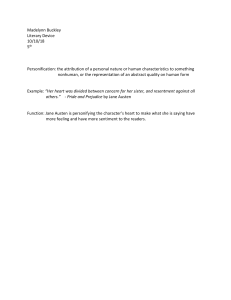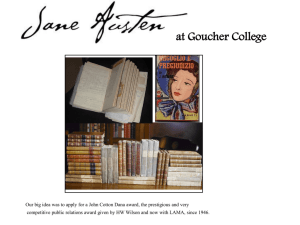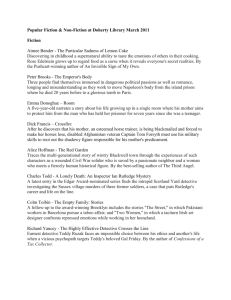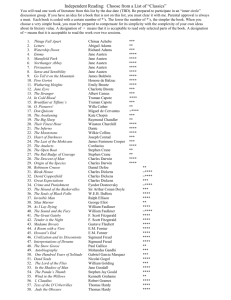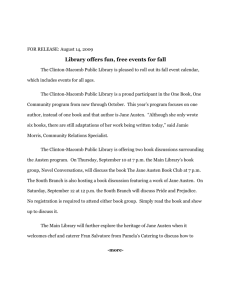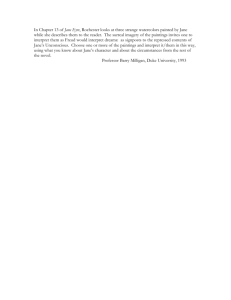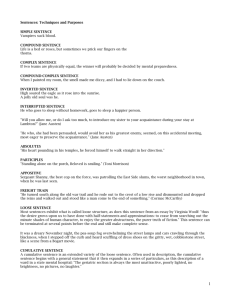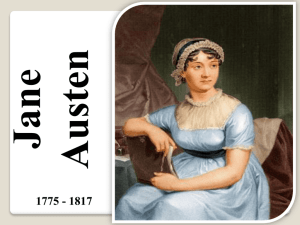Graduate Seminar EL6012
advertisement
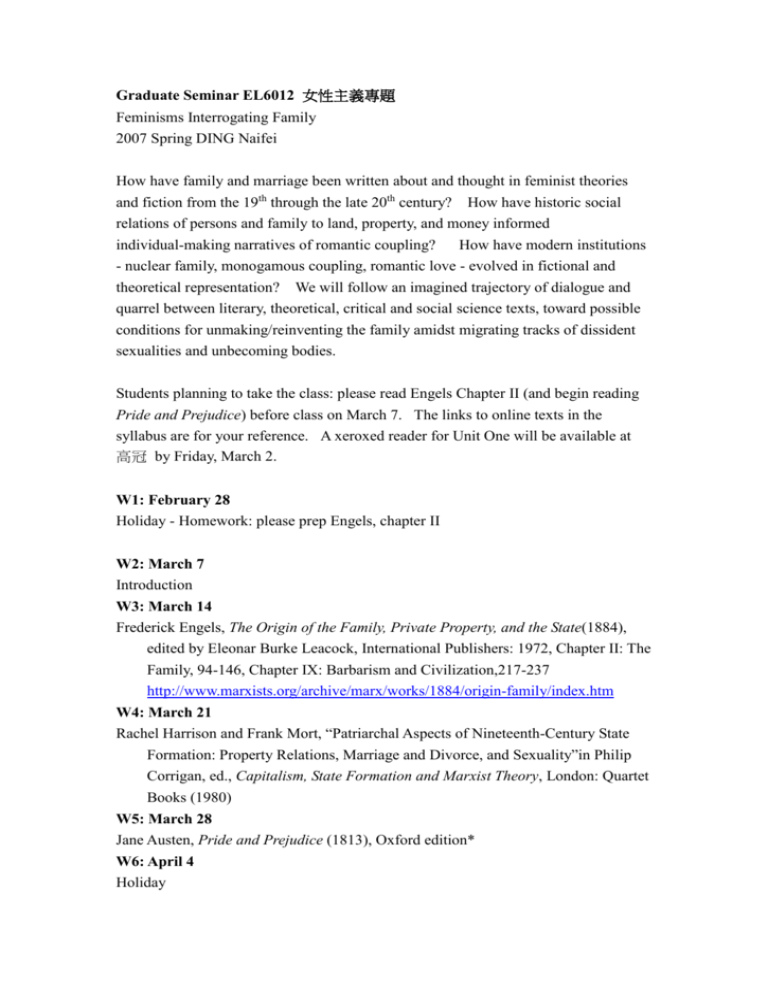
Graduate Seminar EL6012 女性主義專題 Feminisms Interrogating Family 2007 Spring DING Naifei How have family and marriage been written about and thought in feminist theories and fiction from the 19th through the late 20th century? How have historic social relations of persons and family to land, property, and money informed individual-making narratives of romantic coupling? How have modern institutions - nuclear family, monogamous coupling, romantic love - evolved in fictional and theoretical representation? We will follow an imagined trajectory of dialogue and quarrel between literary, theoretical, critical and social science texts, toward possible conditions for unmaking/reinventing the family amidst migrating tracks of dissident sexualities and unbecoming bodies. Students planning to take the class: please read Engels Chapter II (and begin reading Pride and Prejudice) before class on March 7. The links to online texts in the syllabus are for your reference. A xeroxed reader for Unit One will be available at 高冠 by Friday, March 2. W1: February 28 Holiday - Homework: please prep Engels, chapter II W2: March 7 Introduction W3: March 14 Frederick Engels, The Origin of the Family, Private Property, and the State(1884), edited by Eleonar Burke Leacock, International Publishers: 1972, Chapter II: The Family, 94-146, Chapter IX: Barbarism and Civilization,217-237 http://www.marxists.org/archive/marx/works/1884/origin-family/index.htm W4: March 21 Rachel Harrison and Frank Mort, “Patriarchal Aspects of Nineteenth-Century State Formation: Property Relations, Marriage and Divorce, and Sexuality”in Philip Corrigan, ed., Capitalism, State Formation and Marxist Theory, London: Quartet Books (1980) W5: March 28 Jane Austen, Pride and Prejudice (1813), Oxford edition* W6: April 4 Holiday W7: April 11 Charlotte Bronte, Jane Eyre (1847), Norton edition* First essay due Recommended: Jack Goody, “Class and Marriage” in Production and Reproduction: A Comparative Study of the Domestic Domain, Cambridge University Press (1976), 99-114 D.A. Miller, Jane Austen or the Secret of Style (Princeton 2005) http://press.princeton.edu/chapters/s7620.html Rajeswari Sunder Rajan, You-Me Park (eds), Postcolonial Jane Austen, Routledge (2000) W8: April 18 Jean Rhys, Wide Sargasso Sea (1966), Norton edition* Gayatri C. Spivak, “Three Women's Texts and a Critique of Imperialism” (1985) in Bill Ashcroft, Gareth Griffiths, and Helen Tiffin, eds., The Post-Colonial Studies Reader, London: Routledge, 1995, 269-272 W9: April 25 Gayle Rubin, “The Traffic in Women: Notes on the Political Economy of Sex,” in Rayna R. Reiter, Ed., Toward an Anthropology of Women (1975) Adrienne Rich, “Compulsory Heterosexuality and Lesbian Existence” (1980) in Blood, Bread and Poetry (1986, 1994), http://www.terry.uga.edu/~dawndba/4500compulsoryhet.htm W10: May 2 Jamaica Kincaid, Lucy (1990) Raymond T. Smith, "Hierarchy and the Dual Marriage System in West Indian Society," in Jane Collier and Sylvia Yanagisako, ed., Gender and Kinship:Essays Toward a Unified Analysis, Stanford University Press (1987) W11: May 9 Michelle Cliff, No Telephone to Heaven (1996)* Second essay due Recommended: Hortense J. Spillers, “Notes on an alternative model – neither/nor” (1986) in Elizabeth Meese and Alice Parker, ed., The Difference Within: Feminism and Critical Theory, Amsterdam: John Benjamins Publishing Company 1989, 165-187 Bruce Robbins, “Soul-Making: Gayatri Spivak on Upward Mobility” in Cultural Studies, 17:1 (2003), 16-26 W12: May 16 Gayle Rubin, “Thinking Sex” Gayle Rubin, “Thinking Sex: Notes for a Radical Theory of the Politics of Sexuality,” in H. Abelove, M. A. Barale, and D. M. Halperin, (Editors), The Lesbian and Gay Studies Reader (1993), 3-44 W13: May 23 Leslie Feinberg, Stone Butch Blues (1993) W14: May 30 Eric Michaels, Unbecoming (1997) Simon Watney, “Sex, diversity and disease” and “Infectious desires” in Policing Desire: Pornography, AIDS and the Media, University of Minnesota, 1987 W15: June 6 Lillian Ng, Silver Sister (1995) [黃貞才,<銀姐>,智庫:1999] Arlie Russell Hochschild, “Love and Gold” in Global Woman: Nannies, Maids, and Sex Workers in the New Economy (2004), 15-30 Recommended: “Mui Tsai through the Eyes of the Victim: Janet Lim’s Story of Bondage and Escape” in Maria Jaschok and Suzanne Miers, eds., Women and Chinese Patriarchy: Submission, Servitude and Escape, Zed Books (1994), 108-121 Rosemary Marangoly George, The Politics of Home: Postcolonial relocations and twentieth-century fiction, University of California (1999), chapters 1 & 6 W16: June 13 Wrap-up Third essay due Requirements: Attendance and participation (10%) Three 7-10 page essays due the last day of each unit; no late papers (40%) Oral presentation (20%)
